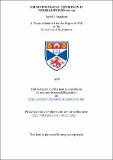Eschatological themes in II Thessalonians 2:1-12
Abstract
II Th. 2:1-12 is one of the most difficult passages in the N.T., treating, as it does, of eschatological themes which do not re-appear in Pauline Literature. The thesis is an attempt to deal adequately with these themes. First though, the authenticity of II is considered (chp.1) and held to be by Paul. The eschatology of II. 2 is then related to the eschatology of the two Thessalonian letters and it is concluded that a great deal of pre-Pauline material exists in the epistles, (chp.2). A detailed study is made of the problem which gave rise to II.2 by looking at the pastoral concern of the Apostle, the statement which caused the difficulty (The Day of the Lord has come) and the means by which the error was spread. It is concluded that some at Thessalonica were reading 'present salvation' into the expression 'Day of the Lord', whilst at the same time not denying necessarily a future Parousia of Christ, (chp.4). The next three chapters (5-7) look at the three themes which Paul uses to show the Day has not yet arrived : The Apostasy, The Anomos and The Katechon (ōn). The Apostasy is viewed as religious and takes place within the bosom of the church. The Anomos theme is studied against the suggested backgrounds of historical precursors and the Belial (Beliar) myth. The conclusion reached is the Antichrist (=Anomos) idea is the creation of the early church drawing upon elements found in the descriptions of earlier figures, e.g. Antiochus IV. The Anomos figure must be understood from texts showing Satanic possession since those aid an understanding of his relationship to Satan. Details within the passage of the appearance and activity of the Anomos throw light on the conception of the figure; he is set up as a mocking counterpart to Christ and his parousia, (chp.6). The last chapter argues for a theocentric understanding of the Katechon with the Greek verb being translated 'restrain'. Paul is here referring to God and His restraint. The background to this lies in the thought of God holding onto evil and then allowing it to flourish for a set time. Evidence for this is provided and considered. Paul has developed themes which counter an error in the early church. By dealing with events associated with the Day of the Lord he has shown that the Day cannot have come.
Type
Thesis, PhD Doctor of Philosophy
Collections
Items in the St Andrews Research Repository are protected by copyright, with all rights reserved, unless otherwise indicated.

